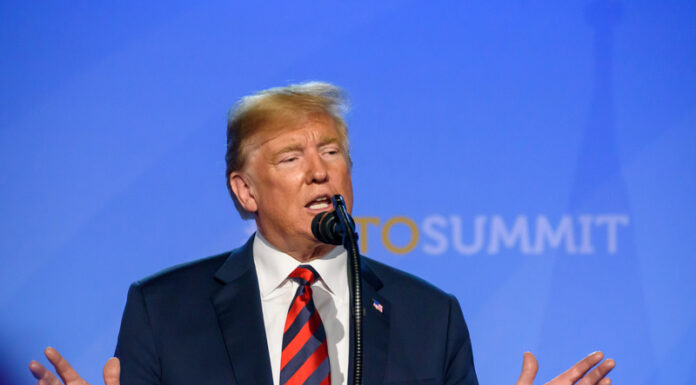The Trump administration is openly defying a Supreme Court order to return Kilmar Abrego Garcia, a Maryland man wrongfully deported to El Salvador, back to the United States.
Despite a unanimous Supreme Court ruling on April 11 that requires the government to “facilitate” Abrego Garcia’s release from a Salvadoran prison and ensure his case is handled properly, the administration has refused to take meaningful action.
Abrego Garcia was among more than 250 Venezuelan and Salvadoran immigrants transported on three planes to CECOT, a notorious Salvadoran prison, on March 15. He had been arrested by ICE in a targeted operation in Maryland based on an unsubstantiated accusation from 2019 that he was affiliated with the MS-13 gang.
An immigration judge previously found Abrego Garcia’s testimony, including his denial of gang affiliation, “credible” and “free of embellishment.” The judge granted him withholding removal status, legally protecting him from deportation to El Salvador. Despite this protection, the Trump administration deported Abrego Garcia anyway.
Following the Supreme Court’s order, District Judge Paula Xinis issued an additional order declaring the administration in violation of her previous directive to return Abrego Garcia to the U.S. She ordered administration lawyers to provide daily updates on Abrego Garcia’s physical location and detail steps taken to facilitate his return.
The Department of Justice has largely ignored these requirements. In status reports filed on April 12 and 13, administration lawyers confirmed Abrego Garcia was alive and in CECOT but provided no information about efforts to secure his release.
Instead, the administration has doubled down on its claim that Abrego Garcia is an MS-13 gang member, despite this accusation being previously discredited in court. In their April 13 filing, administration lawyers claimed “Abrego Garcia is no longer eligible for withholding of removal because of his membership in MS-13 which is now a designated foreign terrorist organization.”
The administration’s filing notably omits the fact that a judge found the gang accusation to be false in the subsequent trial where Abrego Garcia was granted protection from deportation.
President Trump, appearing alongside Salvadoran President Nayib Bukele, falsely claimed that the Supreme Court ruled “in our favor” on the case. Attorney General Pam Bondi similarly mischaracterized the ruling, stating that “Two courts ruled that [Abrego Garcia] was a member of MS-13,” and claiming the Supreme Court only required the administration to “provide a plane” if Bukele chose to release him.
President Bukele has called the suggestion of releasing Abrego Garcia “preposterous,” asking how he could “smuggle” a “terrorist” into the United States.
On April 12, Abrego Garcia’s lawyers filed a brief stating that “the Government defied an order of this Court, and of the Supreme Court, by refusing to provide even basic information about Abrego Garcia’s current location and status and what it is doing to comply with the injunction.” They requested that Judge Xinis order the administration to immediately take steps to comply with both courts’ orders, begin discovery proceedings, and consider holding the administration in contempt.
The administration responded by claiming the Supreme Court order did not actually require them to return Abrego Garcia to the U.S. and that Judge Xinis lacked the authority to order them to do so.
In court filings, the administration has attempted to redefine the word “facilitate” to mean only removing domestic obstacles that would impede Abrego Garcia’s ability to return, rather than actively securing his release. “Taking ‘all available steps to facilitate’ the return of Abrego Garcia is thus best read as taking all available steps to remove any domestic obstacles that would otherwise impede the alien’s ability to return here,” the administration argued. “Indeed, no other reading of ‘facilitate’ is tenable—or constitutional—here.”
This interpretation directly contradicts what the Supreme Court actually ordered: that the administration actively “‘facilitate’ Abrego Garcia’s release from custody in El Salvador and to ensure that his case is handled as it would have been had he not been improperly sent to El Salvador.”
In a recent hearing, Judge Xinis emphasized the urgency of the situation, stating, “It is a fact now of this record that every day Mr. Garcia is detained in CECOT is a day of irreparable harm.”
The administration’s legal argument relies heavily on the Supreme Court’s Trump v. U.S. decision, which effectively declared that presidential “official acts” are inherently legal. Citing this case, the DOJ response claims that “The federal courts have no authority to direct the Executive Branch to conduct foreign relations in a particular way, or engage with a foreign sovereign in a given manner. … Such power is ‘conclusive and preclusive,’ and beyond the reach of the federal courts’ equitable authority.”
Kim Wehle, a constitutional scholar, has warned that this approach poses significant dangers beyond this individual case. “The administration could potentially apply the same principle to deprive U.S. citizens of their right to due process by removing them from the country,” Wehle noted.
The administration’s defiance has prompted action from lawmakers. Democratic Senator Chris Van Hollen of Maryland has stated he would travel to El Salvador if Abrego Garcia is not returned by mid-week.
Judge Xinis has given the administration two weeks to provide detailed information under oath about its attempts to return Abrego Garcia. The judge directly told the administration’s lawyer to cancel any other plans during this period, underscoring the gravity of the situation.
The case has significant implications for the separation of powers in the United States. If the administration’s defiance is allowed to stand, it would establish a precedent where the executive branch could claim anyone is a gang member without evidence, deny them due process, and send them to a foreign prison for a life sentence beyond the reach of U.S. law.








